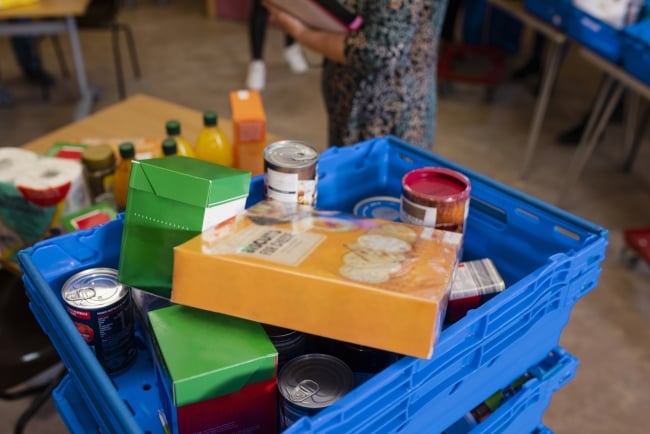You have /5 articles left.
Sign up for a free account or log in.

Rather than paying the university for a parking violation, college students at some campuses can donate cans of food or personal hygiene items.
SolStock/E+/Getty Images
Bartering with food may be common in the dining hall, but a growing number of college administrators will also accept canned food items to forgive student parking citations.
Rather than paying off their debts for improper or hazardous parking with cash, college students can opt to donate nonperishable food items to their institution, which are in turn given to their peers in the on-campus food pantry.
Higher education Donations for Citations drives help combat basic needs insecurity among students on campus and raise awareness of how peers can support these efforts.
What’s the need: College students are more likely to experience basic needs insecurity compared to U.S. adults in general, with between 33 percent and 51 percent of all students being food insecure, compared to around 10 percent of the general population.
When learners are unable to afford food or housing, they often have worse academic performance and overall outcomes. A 2023 report from Trellis Research found just under half of students who experienced financial challenges while enrolled had difficulty concentrating on their academics due to their financial situation.
College pantries are largely funded by donations or in collaboration with other organizations that offer similar services, such as the local food bank or nonprofit groups, making outside support critical to continuous operation.
How it works: Each campus sets a range or the number of food items a student must donate to apply to their fees. The University of Kentucky asks for 10 nonperishable items or five personal care items to waive a citation of $30, whereas Montclair State University credits a student $10 toward open citations for each item donated. George Mason University values 10 food items as $20 and five personal hygiene products as $15.
Most institutions limit the kinds of citations that can be forgiven through pantry donations. The University of Missouri only allows students with a fee for parking at an expired meter or without permission to forgive their debts with donations to the Tiger Pantry.
Some institutions allow learners to donate year-round to waive fees. Others implement special food drives during the term that target specific items for which the pantry has greater need.
Both the University of Texas at San Antonio and Cleveland State University have peanut butter–specific campaigns, asking students to donate plastic jars of peanut butter (or other forms of nut butter). West Virginia University’s pantry, the Rack, has an Amazon wish list kept updated with in-demand items that can be donated in lieu of paying parking tickets.
Donations are made directly to the office responsible for parking citations, which are then given to the pantry.
At the University of Tennessee, Knoxville, the effort extends beyond students who have acquired parking tickets to faculty and staff as well. Campus community members aren’t required to have a fine to give back during the donation drives, either.
The impact: The initiatives have been largely successful in garnering donations and encouraging students to give back.
The University of Kentucky has run Donations for Citations since 2016, and it continues to be the largest contributor of food and personal care items to the pantry, according to an October press release from the university.
At Rice University, students donated more than 1,800 items in 2023, crediting $10,290 in citations written in the fall term.
Do you have a wellness tip that might help others encourage student success? Tell us about it.




